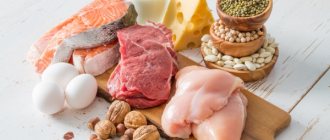Why does the body need carbohydrates?
Carbohydrates are organic substances consisting of hydrogen, carbon and oxygen. A person is able to generate a source of energy on his own, but the main supply of strength comes from eating food.
Cereals contain 85% carbohydrates, sugar – 99%.
Carbohydrates are divided into 2 types:
- simple;
- complex;
The first type is found in sugar, honey, and sweets. Such substances are easily absorbed by the body and enter the bloodstream. Doctors recommend consuming these products in small quantities.

Complex carbohydrates include starch, fiber, dietary fiber, etc. They are absorbed more slowly. They are allowed to be consumed in sufficiently large quantities.
Functions of carbohydrates in the human body:
- provide energy;
- strengthen tissues;
- prevent the growth of bacteria in the stomach;
- break down fats;
- normalize the functioning of the immune system;
- participate in the formation of enzymes and the production of hormones.
What is important to know about carbohydrates to lose weight
The process of losing weight occurs when energy sources do not enter the body. It needs nutrients, which it takes from fat deposits.
Important! Eating excessive amounts of sugary foods increases insulin levels in the blood, which slows down the weight loss process.
Nutritionists strongly recommend avoiding the following foods:
- flour products and potatoes;
- chips, crackers, instant noodles, cereals;
- sweets;
- carbonated drinks, tea with sugar, coffee;
- fruits and berries rich in fructose: bananas, nectarines, plums.
Calculation of the amount of carbohydrates per day
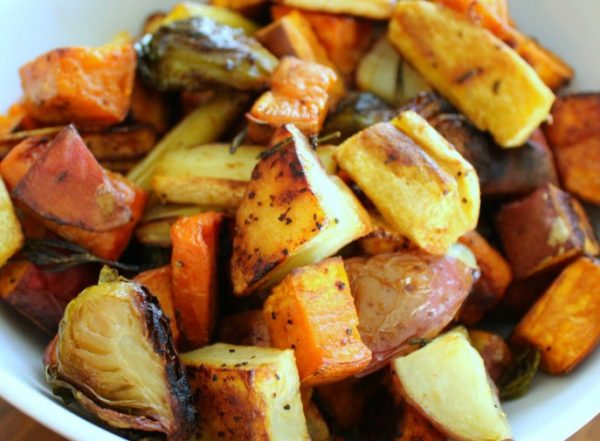
In order to find out the daily norm of energy sources, it is necessary to calculate how many calories a particular person should consume. Based on this figure, you can calculate how much carbohydrates he needs to receive.
Number of calories per gram of each macronutrient:
- Proteins – 30% of calories. 1 gram = 4 kcal.
- Fats – 30% of calories. 1 gram = 9 kcal.
- Carbohydrates – 40% of calories. 1 gram = 4 kcal.
If a person’s norm is 1500 kcal, then the table of proteins, fats and carbohydrates will look like this:
- proteins: (0.3*1500/4) = 113 g;
- fats: (0.3*1500/9) = 50 g;
- carbohydrates: (0.4*1500/4) = 150 g;
It is difficult to adhere to exact numbers, so an error of 5% of the established norm is allowed.
Carbohydrates: daily requirement
The required amount of energy sources depends on a person’s gender, weight and age.
More details about the daily diet can be found in the table:
| Category | Weight | |||
| 40-50 kg | 50-60 kg | 60-70 kg | 70-80 kg | |
| Man gaining weight | 283 g | 294 g | 305 g | 322 g |
| Man losing weight | 159 g | 163 g | 168 g | 173 g |
| Man maintaining body weight | 210 g | 287 g | 303 g | 323 g |
| Woman gaining weight | 203 g | 242 g | 258 g | 271 g |
| Woman losing weight | 118 g | 150 g | 165 g | 153 g |
| Woman maintaining body weight | 145 g | 187 g | 205 g | 217 g |
Energy value of food
The energy released is measured in kilojoules and is called calories. It is necessary to consume the daily norm of energy value.
Otherwise, the person loses or gains weight.
- Proteins: 1 gram = 16.7 kJ.
- Fat: 1 gram = 37.7 kJ.
- Carbohydrates: 1 gram = 16.7 kJ.
Based on these data, you can calculate the energy value of any product. Using wheat bread (second grade) as an example, let’s find the number of calories in 100 g.
It contains 7.1 g of protein, 1.1 g of fat and 46.4 g of carbohydrates. The energy value will be equal to: 16.7*7.1+ 37.7*1.1+46.4*16.7=934 kJ (234 kcal). The calorie content is written on packages of goods, but with fruits, vegetables and flour products you will have to calculate it yourself.
Daily calorie content is determined by the sum of the energy value of food eaten per day.
Fats are good!
Many people associate the word “fat” with being overweight. However, it is a mistake to think that by eliminating them from your diet, you will quickly and successfully lose weight and be a healthy person. In fact, fats are a key component of nutrition; without them, normal metabolism is out of the question. And here it is important to understand that the main sources should be vegetable fats, and not animal fats.
If a man has a goal to lose weight, his daily fat intake should not exceed 40 g. And if he plans to build muscle, the norm doubles. In women, the proportions range from 30 to 60-70 g per day for weight loss and muscle gain, respectively.

Photo: istockphoto.com
What carbohydrates can you eat while losing weight?
When losing weight, it is necessary to exclude simple carbohydrates and consume complex ones. The latter are capable of dissolving into elemental sugar for up to several hours.
The breakdown of these organic substances occurs without increasing insulin in the blood, thanks to which a person does not feel hungry. The body spends a large amount of energy processing such products, burning extra pounds.
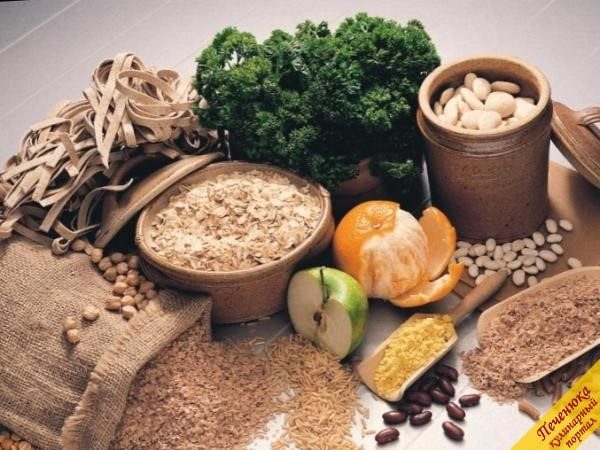
When losing weight, it is necessary to exclude simple carbohydrates and consume complex ones.
The diet must include food containing glycogen, starch, fiber, insulin and pectin. These substances are enzymes that can quickly break down glucose. Their responsibilities also include removing toxins from the stomach and intestines.
Products necessary for a diet containing “good” carbohydrates:
- whole grain bread or bran;
- pasta;
- cereal porridges;
- vegetables (carrots, beets, potatoes, onions);
- beans, soybeans, peas;
You can’t categorically refuse sweets. It is recommended to eat only real dark chocolate.
Fibrous carbohydrates
Fibrous carbohydrates must be eaten during a diet, as they are low in calories, but quickly fill a person. This type also burns fat well.
They are most often found in green vegetables:
- cucumbers;
- broccoli;
- asparagus;
- mushrooms;
- tomatoes;
- pasta;
- Red beans.
To quickly lose weight, girls use lean proteins and fibrous carbohydrates in their diet.
This combination gives quick weight loss, but if a person needs to gain muscle mass, then he should not eat food with these organic substances.
Sweet carbohydrates
This is the name given to simple carbohydrates that have a sweet taste.
Excessive consumption of products containing such an organic compound is harmful to human health. They are quickly broken down in the blood, producing insulin, which is then converted into fat cells.
When dieting, you should avoid foods containing glucose, fructose, and sucrose:
- confectionery;
- sweet carbonated drinks and juices;
- semolina and rice porridges.
Attention! After drinking a small can of Coca-Cola, a person consumes 9 tablespoons of sugar, a cup of latte – 7 tablespoons.
Starchy carbohydrates
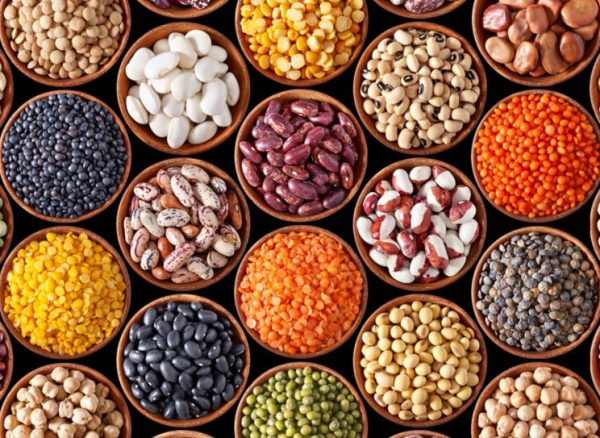
Starchy carbohydrates help you not feel hungry for a long time. With limited consumption of starchy foods, a person will not gain weight.
These include:
- oatmeal, barley;
- rice, buckwheat;
- legumes (peas, beans).
How many carbohydrates should a person consume to lose weight?
Although many studies show that a low-carb diet promotes rapid weight loss, it is often short-term. Instead, nutritionists should pay attention to the balance of carbohydrates, proteins and fats.
In a recent study, researchers compared weight loss between low-fat and low-carb diets. The researchers found that after 6 months of dieting, weight changes were similar in both groups.
Some nutritionists recommend a ratio of 40% carbohydrates, 30% protein and 30% fat for healthy weight loss. But you need to know that each person has different nutritional needs. Individuals' specific needs depend on height, weight, and activity level. A diet that works for one person may not work for another.
It's important to note that not all carbohydrates are created equal; there are "good" and "bad" carbohydrates. To lose weight, you need to consume more good carbohydrates.
Rules for consuming healthy carbohydrates for weight loss
Healthy carbohydrates are complex organic substances; they are the ones that need to be included in your diet when losing weight.
You need to know a number of rules, without which the desired result cannot be achieved:
- Simple carbohydrates should make up only 15% of the components consumed. The remaining 85% is starchy.
- It is necessary to eat vegetables and fruits rich in fiber.
- To lose weight, it is important to consume proteins together with carbohydrates, as they will help gain lean body mass.
- You should not eat a lot of food at one time. It is better to break your meals into several parts and eat in small portions.
- Confectionery products are best consumed in the morning, before lunch. In the evening, sucrose is poorly absorbed by the body, which causes unnecessary fat mass to appear.
When creating any diet, it is necessary to include a combined set of products. You can’t eat just one thing, like rice. When dieting, it is necessary to include vegetables and grains in the diet.
How many carbohydrates do you need per day when losing weight?
Depending on how long a person wants to lose excess weight, nutritionists draw up the daily intake of foods containing carbohydrates:
- 100-150 g. Average value, which is suitable for maintaining mass. Further reduction in the norm will lead to weight loss.
- 50-100 g. By taking this amount of carbohydrates, a person will begin to lose kilos without feeling it. It is only important to maintain a diet and eat food that does not leave you feeling hungry for a long time.
- 20-50 g. This amount will lead to weight loss in a short time.
Important! You cannot start losing weight without the help of a nutritionist, as a lack of substances can lead to serious disorders in the body. A famous example of the consequences of dieting is anorexia. In most cases, if this disease is not overcome, death occurs.
The type of life a person leads plays a big role. During physical activity, nutritionists believe that it is necessary to consume 4 g of carbohydrates per kilogram of a person’s weight.
It is important to exercise, otherwise the weight will not come off. In the absence of physical activity, the norm drops by half - to 2 g per kilogram of body weight.
Calculation of the correct ratio of proteins, fats and carbohydrates in the diet

In order for your diet to be called correct, it must be balanced and, above all, in proteins, fats and carbohydrates.
To lose weight or gain weight, the ratio of proteins, fats and carbohydrates should be: 25%/30%/45% (respectively). This is a high-protein diet that helps you lose weight fairly quickly.
This ratio of BJU as a percentage must be adhered to for 3-4 weeks, and then the amount of protein must be reduced, thereby increasing the amount of carbohydrates. For normal weight, the BJU ratio will be 15-18%/30%/55-52% (it all depends on the level of physical activity).
Hence the conclusion: if a person wants to lose weight, then he must increase the amount of protein in his diet and reduce the amount of carbohydrates. At the same time, remember that it is precisely when there is an excess of carbohydrates in the body that fats are synthesized.
In a word, if you eat a lot of fast carbohydrates, the energy from which you are not able to use, your weight will gradually increase. And if there is also an excess of fat, then the extra pounds will begin to gain at double the speed.
To understand how many grams of protein, fat and carbohydrates you should consume during the day, you need to know your daily calorie intake (read about calculating your daily calorie needs here).
Now calculate, based on the percentages indicated above, how many calories should come from proteins, fats and carbohydrates.
To calculate BJU in grams, keep in mind that the breakdown of 1 g of protein releases 4.1 kcal, 1 g of fat - 9.3 kcal, 1 g of carbohydrates - 4.1 kcal.
For a better understanding, here is a clear example:
Let's say a person's daily calorie requirement is 2000 kcal. This means that per day he should receive 500 kcal from proteins (25% of 2000 kcal), 600 kcal from fats (30% of 2000 kcal) and 900 kcal from carbohydrates (45% of 2000).
Now we’ll find out how much protein, fat and carbohydrates should be consumed in grams: - proteins - 121 g (500/4.1); — fats – 64.5 g (600/9.3); - carbohydrates - 219.5 g (900/4.1).
Using the above formula, you can easily determine the ratio of proteins, fats and carbohydrates, as well as calculate BJU in calories and grams.
Let us remember that all these calculations are carried out for body weight that does not go beyond the norm. If you need to lose weight, then the daily calorie content of your diet should be approximately 20% lower than the daily calorie requirement (weight loss occurs only with a calorie deficit). A calorie deficit of 20% of the daily requirement is enough to systematically lose extra pounds.
Do not forget that a large calorie deficit is equated by the body to forced hunger, as a result of which it slows down the metabolism, and with it the rate of weight correction. In addition, with the slightest increase in calorie intake, the body will begin to actively accumulate fat deposits, creating a reserve in case of repeated energy deficiency.
This is a protective reaction of the body developed over thousands of years. In addition, do not forget that with a sharp lack of nutrients, we experience severe stress (the self-preservation instinct is triggered, which actually slows down metabolism). During times of stress, shock doses of cortisol are released into the blood.
This hormone is responsible for the accumulation of fat, in particular abdominal fat, which is the most difficult to get rid of.
And finally, the most important fact: abdominal obesity is the most dangerous factor that provokes heart attacks and strokes.
Consequences of a lack of carbohydrates
With a lack of carbohydrates, the body begins to signal a malnutrition. First of all, the body begins to take energy from proteins. Because of this, they cannot perform their functions: synthesize new cells and tissues, produce antibodies and hormones.
Many diets are based on eliminating foods rich in carbohydrates. However, their absence in the body can disrupt the process of burning fat deposits, and the person, on the contrary, will gain weight.
Due to the lack of these components, a person experiences nausea, accompanied by vomiting, headaches, lethargy and fatigue.
Calculation of calorie content and ratio of BZHU
To maintain or lose weight, it is important to know how many calories you need to consume daily.
You can use the following simple algorithm:
- Multiply the mass of a person by 10.
- Human height multiplied by 6.25.
- Add the results of steps 1 and 2.
- Number of years multiplied by 4.9.
- Subtract the result of the calculations in step 4 from the number obtained in the calculation of step 3.
- For men, add the number 5 to the result of step 5, for women, subtract 160.
- The resulting number in step 6 is multiplied by the physical load coefficient:
- In the absence of physical activity, it is equal to 1.2.
- If a person walks a lot, sometimes goes to the pool or does exercises at home, then the coefficient is 1.4.
- If you exercise several times a week – 1.6.
- If a person trains daily and is highly active, then the result obtained in step 6 is multiplied by 1.7.
Protein products
Proteins serve a person to convert fats into energy.
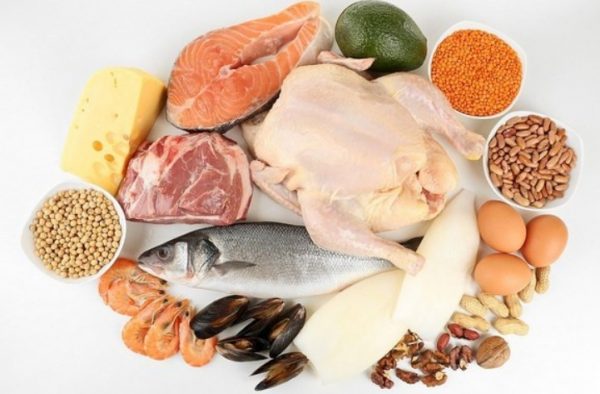
Protein products
When losing weight, it is important to eat foods containing proteins (meat, fish). The components included in these products help to gain muscle mass and also cleanse the body of waste and toxins.
Benefits of eating protein:
- improvement of heart function;
- decreased feeling of hunger;
- removal of excess fluid, which can be deposited in the form of fat reserves;
- improvement of metabolism.
Allowed foods include: chicken, seafood and low-fat dairy products. Among vegetables and fruits, eggplants, avocados, and apples are rich in proteins. A protein diet helps you quickly get rid of extra pounds, but other organic components cannot be completely eliminated.
Fats: get rid of them or leave them
It is not recommended to completely give up fat during a diet, as the person will have difficulty thinking and feel tired.
When dieting, it is recommended to consume foods containing omega-3 fatty acids: salmon, tuna, cabbage, walnuts, parsley.
They perform the following functions:
- improve human memory;
- reduce the likelihood of developing cancer;
- fight fatigue;
- reduce the load on the heart and joints;
- increase skin protection, reducing the load on the skeleton.
Why are proteins, fats and carbohydrates needed?

To correct weight, sometimes it is necessary to recalculate the distribution of BZH during the day. A diet rich in protein is known to promote weight loss. But this does not mean that now all your proper nutrition for weight loss should consist of proteins alone. Carbohydrates and fats also play an important role in our body, and should never be excluded from the diet.
Thus, carbohydrates are our energy reserves and nutrition for the brain, and fats are the key to the proper functioning of the hormonal system and the absorption of fat-soluble vitamins. But proteins are the building material for our muscular system and all cells of the body.
It should be borne in mind that the greater the muscle mass, the less space remains for fat deposits.
To maintain normal muscle mass and weight per day, you need to consume at least 1-1.3 g of protein per kilogram of body weight.
If you need to lose weight or gain muscle mass, this figure can increase to 2 g per kilogram of body weight.
However, you shouldn’t overdo it too much with proteins, just as you shouldn’t consume more than 35 g of them per meal.
As for carbohydrates and fats, in the course of weight correction with proper nutrition it is necessary to switch to the predominance of complex carbohydrates and healthy fats (i.e. fats of vegetable origin).
Try to fill your carbohydrate and fat intake mostly with complex carbohydrates, as well as saturated and unsaturated fatty acids from plant-based foods. Animal fats should be present in the diet in limited quantities, as they contribute to increasing the level of “bad” cholesterol in the blood.
Simple carbohydrates, in turn, when broken down, lead to a sharp release of glucose into the blood, which forces the pancreas to synthesize insulin. Insulin lowers blood glucose levels and converts all excess glucose into fat storage.
Moreover, over time, with frequent releases and large doses of this hormone, the body loses sensitivity to it. This creates insulin resistance, which is a condition for the development of prediabetes.
If you don’t catch it in time and don’t regulate the intake of simple carbohydrates in the body, real type 2 diabetes will form. You can learn what to do about this in our courses on proper nutrition, as well as in the author’s course from the Wellness Consulting Academy “School of Living with Diabetes.”
Therefore, to keep track of simple carbohydrates and other nutrients, we recommend keeping a food diary (read how to do this here)
But complex carbohydrates break down slowly and contribute to the gradual release of glucose into the blood. Ultimately, it is used by the body as food for the brain and as fuel for the body. In this case, insulin is not released, which means that glucose is not transformed into fat.
If you want to lose weight, increase the amount of protein and decrease the amount of carbohydrates, but do not go completely on a no-carb diet.
For carbohydrates, eat all kinds of vegetables and fruits, whole grain cereals and whole grain bread, durum wheat pasta. Find protein in low-fat foods - chicken or turkey fillet, eggs, low-fat cottage cheese, kefir, milk, natural yogurt, rennet cheeses, fish.
Avoid pork and fatty beef, mayonnaise, sauces, sour cream, and fatty dairy products. Let most of the fats be of plant origin: cold-pressed vegetable oils, nuts, etc. Don't forget about Omega-3 fatty acids, which fish oil is rich in.










